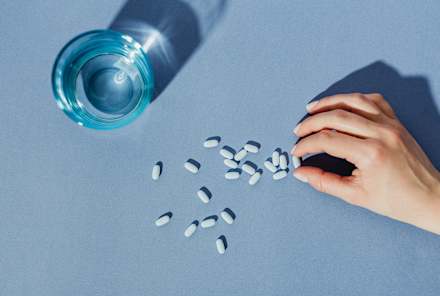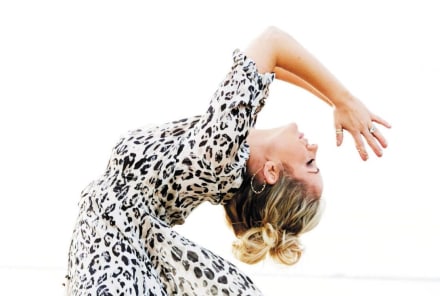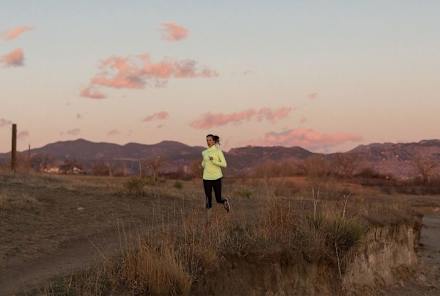Advertisement

Alisa Vitti is an integrative nutritionist, hormone expert, and best-selling author of Woman Code. We’re so excited to add her to our incredible roster of instructors, and if you’re interested in learning more about how to regulate your cycle naturally, balance hormones, boost fertility, and kiss PMS goodbye, check out her newest mbg class offering!
When I was in sixth grade, I started something called "The Period Club" (yes, it’s exactly what it sounds like!). I was so fascinated with everything that goes on with my body every month, I was eager to have my period finally start. Ever since then, I've been obsessed with the brilliant biochemistry of the female body and helping other women learn to feel their very best.
The fact of the matter is, in our society, menstruation is an overlooked, underutilized vital sign. The American Committee of Obstetricians and Gynecologists (ACOG) even published a report1 recommending that teenage girls, their parents, and their clinicians consider the menstrual cycle as the "fifth vital sign" of health. That means that just like your blood pressure or heart rate, your period can tell you a lot about the state of your health.
When your period goes missing, you know that something is amiss, but there are also many other, much more subtle indicators you can observe to glean useful information about your overall well-being. I'm so passionate about this topic, I even made television (and menstrual!) history being the first person ever to demonstrate the variation in period color on The Dr. Oz show in 2015 using juices from fruits and veggies.
Why you should be looking at your period as a vital sign.
Whether you know it or not, the appearance of your menstrual blood and the duration of your period can reveal a lot about your health, including whether or not you have a hormonal imbalance that could lead to other issues. Sometimes those issues are OK, depending on your body, but I've noticed these patterns resurface again and again in my practice. The good news? It’s totally possible to help all hormonal imbalances and their resulting symptoms by addressing diet and lifestyle. But first, you have to know what you're dealing with.
This is what your period should look like.
While you may not think there’s a standard to strive for with your monthly flow, there are some clear indications that your hormones are happy. The ideal cycle:
- Lasts three to eight days2
- Starts and ends with a bright cranberry color
- Is the consistency of Jell-O mix that hasn’t set yet (medium viscosity, not too thin, not too thick)
- Occurs every 24 to 38 days
There are many dietary and lifestyle reasons why this cycle gets thrown off. Sometimes it's a one- or two-month situation, and sometimes cycle issues can last years.
What the color of your period can tell you.
The best way to start troubleshooting issues like PMS, endometriosis, PCOS, and more is to start paying close attention to your period and using it as a barometer of how well your diet and lifestyle are supporting your hormones. If your cycle isn’t as I described above, then it’s time to immediately make dietary changes to get your cycle back to a healthy flow.
Here's a guide for you to use for interpreting the color of your cycle every month. If you have:
Brown, spotty stains.
The problem: That brown stuff is old oxidized blood that didn’t make it out of your uterus during the last cycle, and is linked to low levels of progesterone2. Low progesterone can be a trigger for many period-related problems, and it can also lead to irregular ovulation and infertility.
Dark blue or red heavy bleeding with clots.
The problem: Are you changing your pad or tampon once an hour? Do you have special sheets for that time of the month? Do you have large clots that are dark purple in color? If so, you could have elevated estrogen levels3. Estrogen builds the lining of your uterus, and if your diet hinders the breakdown o this hormone, it can build up and wreak havoc on your cycle. In addition to the heavy bleeding and clots, you may also struggle with endometriosis4, fibroids5, ovarian cysts3, or in some cases, polyps6.
Pale-red, very short periods, light bleeding, or skipped periods.
The problem: A short period (less than three days in length) and/or very light bleeding can indicate low estrogen levels. Your hormones are made from the food you eat, so your low estrogen is likely due to vitamin and nutrient deficiencies from improper or extreme dieting as well as from adrenal burnout. Not having enough estrogen puts your heart and bone health7 at risk.
There are many other ways observing the performance of your cycle overall can provide you with insight into your health. Missing periods, PMS symptoms, delayed periods, frequent periods, and spotting are all things you should take seriously—asking your health care provider about these symptoms is a good place to start, specifically one who has a holistic approach to women's health.
Despite the myth that your hormones are mysterious, unpredictable, and afford you no opportunity to do anything to make them better, the truth is that your hormones are extremely responsive to food and micronutrient therapy. In fact, a recent study showed that simply by eating more fish oil and beans women can delay the start of menopause by several years! Just think what the right foods can do for your PMS in one to three cycles! I believe that you can change the quality of your period overall with food and supplements.
Every month, look before you flush. Think of it this way—period blood is essentially free lab results for you to check on how your diet and lifestyle are affecting your hormones. When you see something that isn't what it should be, you can start making changes to your diet and lifestyle accordingly. You can actually see when it's working, and typically you can see changes within two to three cycles.
Next up: Here's how to take care of yourself during your period week.

Alisa Vitti, HHC, AADP, is an integrative nutritionist, hormone expert, and the best-selling author of WomanCode (Harper Collins).
Alisa is the founder of FLOliving.com, the trusted virtual destination site for women to naturally balance their hormone and reproductive issues with her proprietary "pro-hormonal" five-step dietary process that treats the root cause of endocrine dysfunction. She teaches women via her online program the WomanCode System. She posts a twice-weekly blog read by thousands of women in 45 countries about how to use food to end hormonal chaos and get into hormonal "flo."
A graduate of Johns Hopkins University and the Institute for Integrative Nutrition, Alisa has been featured on The Dr. Oz Show, has a web series on Lifetime, and has been a regular contributor for CBS, Fox, Shape, Women’s Health, mindbodygreen, and the Huffington Post. She pens the "Hormone Whisperer" column for Yahoo Health and serves on their health advisory board.
She speaks to large groups about the intersection of hormones, neurochemistry, feminine energy, entrepreneurship, and success at TEDx, Talks@Google, Summit Series Outside, Hay House, WIE Symposium, and SHE Summit.
Everyone you know is hormonal. Alisa believes together we can end the pervasive hormonal suffering women experience in our modern lifestyle. Spread some good ovary karma by subscribing to her blog and following her on Facebook, Twitter, Pinterest, YouTube, and Instagram.
More from the author:
The Ultimate Guide To A Healthy Period
Check out Want To Learn How To Make Your Period Less Painful & Regulate Your Cycle Naturally?
More from the author:
The Ultimate Guide To A Healthy Period
Check out Want To Learn How To Make Your Period Less Painful & Regulate Your Cycle Naturally?

Alisa Vitti, HHC, AADP, is an integrative nutritionist, hormone expert, and the best-selling author of WomanCode (Harper Collins).
Alisa is the founder of FLOliving.com, the trusted virtual destination site for women to naturally balance their hormone and reproductive issues with her proprietary "pro-hormonal" five-step dietary process that treats the root cause of endocrine dysfunction. She teaches women via her online program the WomanCode System. She posts a twice-weekly blog read by thousands of women in 45 countries about how to use food to end hormonal chaos and get into hormonal "flo."
A graduate of Johns Hopkins University and the Institute for Integrative Nutrition, Alisa has been featured on The Dr. Oz Show, has a web series on Lifetime, and has been a regular contributor for CBS, Fox, Shape, Women’s Health, mindbodygreen, and the Huffington Post. She pens the "Hormone Whisperer" column for Yahoo Health and serves on their health advisory board.
She speaks to large groups about the intersection of hormones, neurochemistry, feminine energy, entrepreneurship, and success at TEDx, Talks@Google, Summit Series Outside, Hay House, WIE Symposium, and SHE Summit.
Everyone you know is hormonal. Alisa believes together we can end the pervasive hormonal suffering women experience in our modern lifestyle. Spread some good ovary karma by subscribing to her blog and following her on Facebook, Twitter, Pinterest, YouTube, and Instagram.
7 Sources
- https://www.acog.org/Clinical-Guidance-and-Publications/Committee-Opinions/Committee-on-Adolescent-Health-Care/Menstruation-in-Girls-and-Adolescents-Using-the-Menstrual-Cycle-as-a-Vital-Sign
- https://www.ncbi.nlm.nih.gov/books/NBK279054/
- https://www.ncbi.nlm.nih.gov/pmc/articles/PMC5779569/
- https://www.ncbi.nlm.nih.gov/pubmed/12650711
- https://www.ncbi.nlm.nih.gov/pubmed/27872195
- https://www.ncbi.nlm.nih.gov/pubmed/17478359
- https://www.ncbi.nlm.nih.gov/pmc/articles/PMC1451218/
Watch Next
Enjoy some of our favorite clips from classes
Enjoy some of our favorite clips from classes
What Is Meditation?
Mindfulness/Spirituality | Light Watkins
Box Breathing
Mindfulness/Spirituality | Gwen Dittmar
What Breathwork Can Address
Mindfulness/Spirituality | Gwen Dittmar
The 8 Limbs of Yoga - What is Asana?
Yoga | Caley Alyssa
Two Standing Postures to Open Up Tight Hips
Yoga | Caley Alyssa
How Plants Can Optimize Athletic Performance
Nutrition | Rich Roll
What to Eat Before a Workout
Nutrition | Rich Roll
How Ayurveda Helps Us Navigate Modern Life
Nutrition | Sahara Rose
Messages About Love & Relationships
Love & Relationships | Esther Perel
Love Languages
Love & Relationships | Esther Perel


















